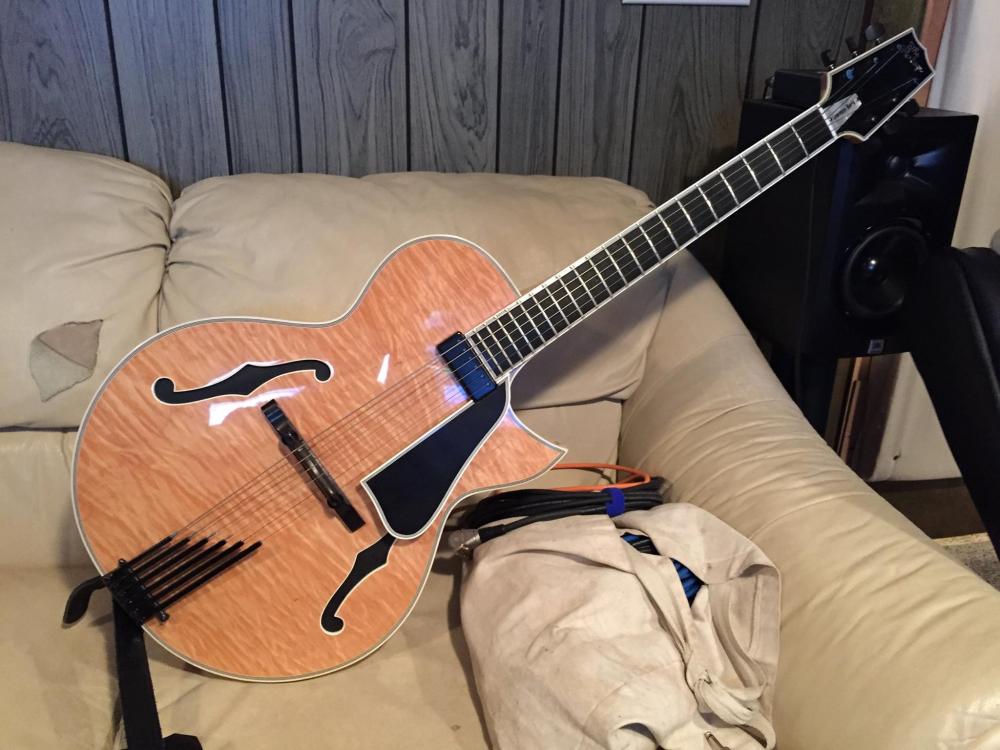-
Posts
12,730 -
Joined
-
Last visited
-
Days Won
1 -
Donations
0.00 USD
Content Type
Profiles
Forums
Events
Blogs
Posts posted by Jim Alfredson
-
-
I could make it a yearly total. $1800 a year.
-
-
One major problem with the vinyl resurgence is the lack of quality pressing plants. I am personal friends with a guy that makes a LOT of money because he's one of the few (less than five) people in the country that knows how to repair and calibrate the lathes used to cut the masters. And then there's the pressing machines themselves; they are ancient and need maintenance, repair, new parts machined, etc.
The predominant reason why I have not re-issued any of my back catalog on vinyl is because I do not trust the current pressing plants to make a great sounding record. Too many of the people who knew how to do so are gone and the machines need massive work. There is a real art and science to it.The other reason is because I don't think vinyl sounds good compared to modern uncompressed digital sources.
-
It is indeed a Heritage and is his own custom model called the LB-1 (Larry Barris is the guitarist... LB...) He's having another one made that will be black with the wood grain showing through. It's a stunning guitar and sounds great.
You can see it a bit better in this video.
And here is a picture of it in the studio.
-
I wonder if the software has a limit on how many videos you can post in one thread? Because now the YouTube links are not automatically parsing for me either. Weird. I'll send out yet another support ticket.
-
The Mosaic set is a gem.

-
I am not opposed to this.
-
Yes, that seems to be a bug. I have an email out to the software developer.
I also added an 'offline' option for those that don't want to use Paypal. -
35 minutes ago, JSngry said:
Does the "latest donations" scoreboard need t be visible? Or is there way around that during the donation, keep it private/anonymous?
It can be anonymous.
-
Yes, I think Hustlin' is my second fav. And I totally agree with the comping comment. Kenny Burrell is just masterful.
Anyone else notice the sudden shift from stereo to mono on the second track, at the beginning of Scott's solo? I assume there was an issue with the stereo recorder at the session, as I have the original vinyl and it does the same thing. If I recall correctly, Rudy always had a mono safety running. -
I'm a little surprised that we haven't had a thread about Stanley Turrentine. Or maybe we have but I can't find it. But in any case, here is one.
Stanley is one of my favorite saxophonists. His tone and phrasing always bring a smile to my face and make me want to dance, no matter my mood. I adore the records he did with Shirley Scott, his wife from 1960 to 1970. Right now I'm listening to 'Never Let Me Go', which is one of my favorites. The rhythm section of Major Holley on bass and Al Harewood on drums swings like mad.

I love his work with Max Roach, too in the quartet with his brother, Tommy. This is one of my favorite albums of that era:

I never had the pleasure of seeing Stanley T live. I was going to see him in Ann Arbor at one of the last Ann Arbor Blues & Jazz Festivals in 2000 but he died just days before his scheduled appearance.
What I love most about his playing is his melodic interpretations. He could play any song and make it sound good.
Long live Stanley T and his big tenor sound.
-
Thought some folks around here would dig this.
-
Hello all,
You may have noticed a new DONATE box and button on the forum homepage. I thought this might be easier for most as well as a handy reminder that it does cost money to keep this site afloat. The donate button links directly to my Paypal account. Remember, you can use regular credit/debit cards with Paypal. For those that prefer to write a check, you can make them out to me and send here:
PM ME FOR THE ADDRESS -
It's just changed name. It's now called "Unread Content". It's right there in the upper right.
-
In version 3, Invision created separate log-in and screen names. In version 4, they got rid of that. So now your log-in name is also your screen name. If you'd like to change it, just let me know.
-
Hi Adam,
From your description, I think this is an issue for your Hammond dealer. From what I've heard, this is not something that can be fixed on your own. I think Hammond needs to swap the unit out.
----Jim -
Yes an external mic might be an improvement; it really depends on the quality of the microphone and the preamp in the Marantz unit. What kind of connector does the mic input use?
-
I think pretty much any of the modern clones would sound great through a 145.
-
I got back and forth in regards to high sample rates. It isn't necessarily about hearing the higher frequencies, because that's simply impossible due to the limitations of our auditory system. It is more about pushing the steep cutoff required to limit the bandwidth of the signal far past the audio range in order to essentially nullify aliasing. That said, a sampling rate of 60kHz should be plenty but what we're given instead is 88.2kHz, 96kHz, and 192kHz, the latter being completely ridiculous.
What most people find appealing about analog is the 'warmth', which is a product of even order harmonic distortion and very subtle pitch modulations due to fluctuations in the RPM of the motors driving the reels or the turntable. But that is all achievable in digital, more easily now than ever.
While I think the vinyl craze is neat, I have no interest in buying LPs. I think hi-res digital surround is much more exciting and enjoyable.
Standard CD sampling rate is 44.1 kHz so any filter you use for that frequency is not going to affect any audible frequencies either.
In theory, yes but in practice it's not quite high enough, especially with the brutal cut-off employed. It really depends on the quality of the converter. Properly designed, yes 44.1kHz should be more than enough for the end product. But for the recording process / mixing / processing / plug-ins, a higher sampling rate is definitely better.
-
I got back and forth in regards to high sample rates. It isn't necessarily about hearing the higher frequencies, because that's simply impossible due to the limitations of our auditory system. It is more about pushing the steep cutoff required to limit the bandwidth of the signal far past the audio range in order to essentially nullify aliasing. That said, a sampling rate of 60kHz should be plenty but what we're given instead is 88.2kHz, 96kHz, and 192kHz, the latter being completely ridiculous.
What most people find appealing about analog is the 'warmth', which is a product of even order harmonic distortion and very subtle pitch modulations due to fluctuations in the RPM of the motors driving the reels or the turntable. But that is all achievable in digital, more easily now than ever.
While I think the vinyl craze is neat, I have no interest in buying LPs. I think hi-res digital surround is much more exciting and enjoyable.
-
-
Fifteen years ago, while languishing in traffic between Berkeley, Calif., and Silicon Valley, Carl Haber tuned in to a radio interview with Mickey Hart, the former Grateful Dead drummer turned music preservationist. Dr. Haber, a particle physicist, listened as Mr. Hart discussed his concern over historic audio recordings that were deteriorating. “He was talking about how sound recordings are on these fragile materials,” Dr. Haber recalls. “So it was kind of a challenge, sort of a plea.”
Dr. Haber thought he could help. At the Lawrence Berkeley National Laboratory, where he was developing equipment for the Large Hadron Collider, the world’s most powerful particle accelerator, he had been using precision optical tools to measure devices that would help to track subatomic particles.
Read more: http://www.wsj.com/articles/the-physicist-whos-saving-the-music-1440169464 -
Aphex introduced the Aural Exciter before digital recording was a factor. It was meant to function in the analog world. I was introduced to it at Streeterville studios in Chicago in November of 1977 while we were recording Air Time. Streeterville claimed it was the first unit in Chicago.
Yes, but solid-state recording was all the rage and some people missed the sound of tube preamps, tube mics, tube EQs, etc. I think the original Aural Exciter was a reaction to the increasingly solid-state studio and recording techniques. And most solid-state devices don't sound good when they add harmonic distortion because it's usually odd harmonics.
If the music is killing Scott, it doesn't matter to me either. Though there are people like that Michael Fremer guy who swears anything digital sucks, that's an attitude I can't get with.
Digital is only as good as what you put in it. If you want it to sound lo-fi, you can do that. If you want it to be pristine, you can do that, too. Good digital has no sound.
-
I have one and I've used it for many gigs. My only issues with it are that it takes some time to set up properly in terms of the EQ and it is a bit under-powered. But for smaller venues or venues with a good PA, it's fine. I used it on tour with organissimo back in May in a variety of settings with a Yamaha DXS10 sub to fill out the bottom and it sounded great. You can hear that very rig in this video:
So yes, for the purposes you're detailing, I think it would work great.
_forumlogo.png.a607ef20a6e0c299ab2aa6443aa1f32e.png)




Another Thread Gone Missing
in Forums Discussion
Posted
It just disappeared? What subforum did it reside in?